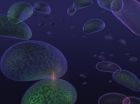(Press-News.org) MAYWOOD, Ill. – In a study published in Nature Medicine, Loyola researchers report on a promising new technique that potentially could turn immune system killer T cells into more effective weapons against infections and possibly cancer.
The technique involves delivering DNA into the immune system's instructor cells. The DNA directs these cells to overproduce a specific protein that jumpstarts important killer T cells. These killer cells are typically repressed in patients who have HIV or cancer, said José A. Guevara-Patino, MD, PhD, senior author of the study. Guevara is an Associate Professor in the Oncology Institute of Loyola University Chicago Stritch School of Medicine.
Guevara and colleagues reported their technique proved effective in jumpstarting defective immune systems in immuno-compromised mice and in human killer T cells taken from people with HIV.
Guevara said a clinical trial in cancer patients could begin in about three years.
The study involved killer cells, known as CD8 T cells, and their instructor cells, known as antigen-presenting cells. The instructor cells instruct CD8 T cells to become killer T cells to kill infected cells or cancer cells -- and to remain vigilant if they reencounter pathogens or if the cancer comes back.
In addition to getting instructions from the antigen-presenting cells, CD8 T cells need assistance from helper T cells to become effective killers. Without this assistance, the killer T cells can't do their job.
In patients who have HIV, the virus destroys helper T cells. In cancer patients, helper T cells also are affected. Among a tumor's insidious properties is its ability to prevent killer T cells from attacking tumors. It does this by putting helper T cells into a suppressed stage, limiting their ability to assist CD8 T cells, said Andrew Zloza, MD, PhD, one of the leading authors of the study.
In the study, snippets of DNA were delivered into skin instructor cells by a device known as a gene gun. The DNA directed the instructor cells to produce specific proteins, which act like molecular keys. When CD8 T cells interact with the instructor cells, the keys unlock the CD8 T cells' killer properties -- jumpstarting them to go out and kill pathogens and cancer cells.
With the use of this technique, the killer T cells would not need the assistance of helper T cells. So even if a tumor were to put the helper T cells in a suppressive cage, the killer T cells would still be able to go out and kill cancer cells. Researchers expect that future studies using the technique will make it applicable to many diseases, including cancer.
###The study received major funding from the national office of the American Cancer Society, the Illinois chapter of the American Cancer Society and the National Institutes of Health.
Other authors are Frederick Kohlhapp (co-first author), Gretchen Lyons (co-first author), Jason Schenkel, Tamson Moore, Andrew Lacek, Jeremy O'Sullivan, Vineeth Varanasi, Jesse Williams, Michael Jagoda, Emily Bellavance, Amanda Marzo, Paul Thomas, Biljana Zafirova, Bojan Polic, Lena Al-Harthi and Anne Sperling.
How to rescue the immune system
Study in Nature Medicine could lead to novel therapy for cancer
2012-02-27
ELSE PRESS RELEASES FROM THIS DATE:
Scientists score 1 more victory over uncertainty in quantum physics measurements
2012-02-27
Most people attempt to reduce the little uncertainties of life by carrying umbrellas on cloudy days, purchasing automobile insurance or hiring inspectors to evaluate homes they might consider purchasing. For scientists, reducing uncertainty is a no less important goal, though in the weird realm of quantum physics, the term has a more specific meaning.
For scientists working in quantum physics, the Heisenberg Uncertainty Principle says that measurements of properties such as the momentum of an object and its exact position cannot be simultaneously specified with arbitrary ...
Math can save Tylenol overdose patients
2012-02-27
SALT LAKE CITY, Feb. 27, 2012 – University of Utah mathematicians developed a set of calculus equations to make it easier for doctors to save Tylenol overdose patients by quickly estimating how much painkiller they took, when they consumed it and whether they will require a liver transplant to survive.
"It's an opportunity to use mathematical methods to improve medical practice and save lives," says Fred Adler, a professor of mathematics and biology and coauthor of a study that developed and tested the new method.
The study of acetaminophen – the generic pain and ...
MIT research: Delivering RNA with tiny sponge-like spheres
2012-02-27
For the past decade, scientists have been pursuing cancer treatments based on RNA interference — a phenomenon that offers a way to shut off malfunctioning genes with short snippets of RNA. However, one huge challenge remains: finding a way to efficiently deliver the RNA.
Most of the time, short interfering RNA (siRNA) — the type used for RNA interference — is quickly broken down inside the body by enzymes that defend against infection by RNA viruses.
"It's been a real struggle to try to design a delivery system that allows us to administer siRNA, especially if you ...
Some bacteria attack using spring-loaded poison daggers
2012-02-27
PASADENA, Calif.—Bacteria have evolved different systems for secreting proteins into the fluid around them or into other cells. Some, for example, have syringe-like exterior structures that can pierce other cells and inject proteins. Another system, called a type VI secretion system, is found in about a quarter of all bacteria with two membranes. Despite being common, researchers have not understood how it works. Now a team, co-led by researchers at the California Institute of Technology (Caltech), has figured out the structure of the type VI secretion system apparatus ...
ZyLAB Honored for 8th Consecutive Year by KMWorld as One of the "100 Companies That Matter in Knowledge Management"
2012-02-27
ZyLAB, a leading provider of eDiscovery and information management solutions, today announced that it has been named to KMWorld Magazine's prestigious list of the "100 Companies that Matter in Knowledge Management." Published annually and in its 12th year, this list recognizes organizations that play a role in the creation and evolution of the knowledge management market through consistent innovation of technologies, products and services. Companies chosen for this list are compiled by KM practitioners, theorists, analysts, vendors and their customers and colleagues. ...
New insights into understanding brain performance
2012-02-27
People who take Ritalin are far more aware of their mistakes, a University of Melbourne study has found.
The study, by Dr Rob Hester from the Department of Psychological Sciences and colleagues at the Queensland Brain Institute, investigated how the brain monitors ongoing behaviour for performance errors – specifically failures of impulse control.
It found that a single dose of methylphenidate (Ritalin) results in significantly greater activity in the brain's error monitoring network and improved volunteers' awareness of their mistakes.
Diminished awareness of performance ...
Irregular heartbeat strong predictor of decline in people at risk of heart disease
2012-02-27
An irregular heartbeat — atrial fibrillation — is a strong predictor of cognitive decline and the loss of independence in daily activities in older people at risk of cardiovascular disease, according to a study in CMAJ (Canadian Medical Association Journal).
Researchers sought to understand whether there was an association between an irregular heartbeat and the loss of mental and physical functions in people at risk of cardiovascular disease. They looked at data from two randomized controlled trials: the ONTARGET and TRANSCEND trials, which involved 31 506 patients from ...
Targeted drug helps leukemia patients who do not benefit from initial therapy
2012-02-27
A new study has found that patients with chronic myeloid leukemia (CML) who have not responded to interferon treatments experience long-term benefits when they switch to the targeted drug imatinib. Published early online in Cancer, a peer-reviewed journal of the American Cancer Society, the study indicates that imatinib is the treatment of choice for these patients.
Imatinib, a drug that blocks the protein made by a particular cancer-causing gene, has revolutionized the treatment and prognosis of patients with CML. Now up to 93 percent of patients who take the drug as ...
Kaiser Permanente study finds obesity-asthma link in children varies by race/ethnicity
2012-02-27
PASADENA, Calif., (February 27, 2012) – Children and adolescents who are overweight or obese are more likely to have asthma than their healthy weight counterparts, according to a new Kaiser Permanente Southern California study published in the online edition of Obesity. The study, which included more than 681,000 children between ages 6 and 19, found that the association between asthma and body mass index varied by race and ethnicity.
The study found that the association between BMI and asthma was weaker for African Americans, a group that was previously known to have ...
Multiple sclerosis: Damaged myelin not the trigger
2012-02-27
Millions of adults suffer from the incurable disease multiple sclerosis (MS). It is relatively certain that MS is an autoimmune disease in which the body's own defense cells attack the myelin in the brain and spinal cord. Myelin enwraps the nerve cells and is important for their function of transmitting stimuli as electrical signals. There are numerous unconfirmed hypotheses on the development of MS, one of which has now been refuted by the neuroimmunologists in their current research: The death of oligodendrocytes, as the cells that produce the myelin sheath are called, ...
LAST 30 PRESS RELEASES:
Columbia announces ARPA-H contract to advance science of healthy aging
New NYUAD study reveals hidden stress facing coral reef fish in the Arabian Gulf
36 months later: Distance learning in the wake of COVID-19
Blaming beavers for flood damage is bad policy and bad science, Concordia research shows
The new ‘forever’ contaminant? SFU study raises alarm on marine fiberglass pollution
Shorter early-life telomere length as a predictor of survival
Why do female caribou have antlers?
How studying yeast in the gut could lead to new, better drugs
Chemists thought phosphorus had shown all its cards. It surprised them with a new move
A feedback loop of rising submissions and overburdened peer reviewers threatens the peer review system of the scientific literature
Rediscovered music may never sound the same twice, according to new Surrey study
Ochsner Baton Rouge expands specialty physicians and providers at area clinics and O’Neal hospital
New strategies aim at HIV’s last strongholds
Ambitious climate policy ensures reduction of CO2 emissions
Frontiers in Science Deep Dive webinar series: How bacteria can reclaim lost energy, nutrients, and clean water from wastewater
UMaine researcher develops model to protect freshwater fish worldwide from extinction
Illinois and UChicago physicists develop a new method to measure the expansion rate of the universe
Pathway to residency program helps kids and the pediatrician shortage
How the color of a theater affects sound perception
Ensuring smartphones have not been tampered with
Overdiagnosis of papillary thyroid cancer
Association of dual eligibility and medicare type with quality of postacute care after stroke
Shine a light, build a crystal
AI-powered platform accelerates discovery of new mRNA delivery materials
Quantum effect could power the next generation of battery-free devices
New research finds heart health benefits in combining mango and avocado daily
New research finds peanut butter consumption builds muscle power in older adults
Study identifies aging-associated mitochondrial circular RNAs
The brain’s primitive ‘fear center’ is actually a sophisticated mediator
Brain Healthy Campus Collaborative announces winner of first-ever Brain Health Prize
[Press-News.org] How to rescue the immune systemStudy in Nature Medicine could lead to novel therapy for cancer

